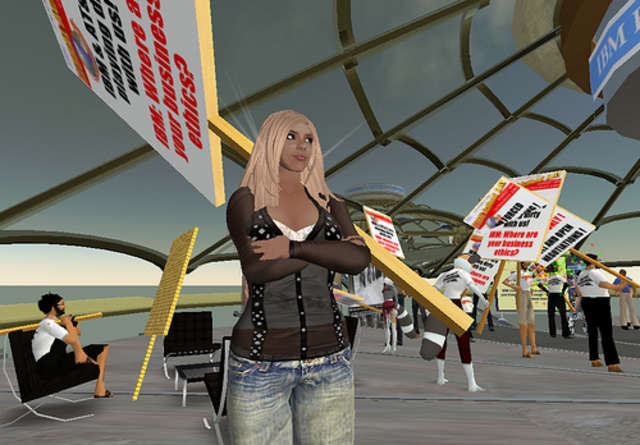Reflections on ONLINE EDUCA Berlin
For those of you who have not been there, On-line Educa Berlin, which claims to be Europe’s biggest event on Technology Enhanced Learning, is a mix between a party, a meet up, a trade exhibition and oh yes, a conference. this year there were once again over 2000 delegates, which, considering the price of the conference for non presenters is over 800 Euro and the general impact of the recession is impressive. Is e-learning standing up despite financial cutbacks? According to the organisers the largest ‘country group; was the Netherlands, followed by the UK, Finland and Norway – although I don’t know quite what this signifies.
Online-Educa is probably not the place to go for cutting edge research and development. Rather it tends ot rflect what is main-streaming and this make sit all the more interesting. the following is a highly impressionistic account fo this years trends / non trends and general goings-on.
Probably the biggest trend is the movement away from a focus on VLEs towards looking at the use of social software for learning. And, linked to that, is a growing realisation or concern about the gap between the way (not just) young people are using social software for communication, leisure, information seeking and learning and the way educational institutions are stumble trying to manage learning through the walled gardens of LMS systems and VLEs. Equally, many speakers pointed out the growing availability of free resources for informal and self directed learning and the need for institutions to rethink their role and how they facilitate learning. None of this is new. What is new is that the idea has moved from being a fringe or minority viewpoint to at least entering the mainstream educational technology discourse. Indeed, in this respect it is interesting to see the recent Guardian newspaper article by Victor Keegan. Keegan says”
” … YouTube is developing into a kind of University of the Grassroots. Instead of learning being a top-down process, dictated by institutions and governments, it is evolving into a bottom-up process driven by users.
If you want to learn, say, the Python programming language (often used in mobile phones) then your first move may not be to sign up at a local educational institution but instead to look at one of the YouTube videos and benefit from the reactions of other viewers. Education has been slower than other sectors to respond to the digital revolution but, as elsewhere, the direction is being dictated by users….
It is difficult to predict what effect all this will eventually have on education but it could be profound. It must be questionable whether you need three years to complete a PhD when you have instant access to so many archived books as a result of Google’s book-scanning programme. …But, increasingly, the basic street-wise skills people will need during the digital revolution may more easily, and certainly more quickly, be learned from the People’s University of the Internet than from an academic institution.”
In the sessions I attended, there seemed to be more of a focus on pedagogy or suing technology for tecahing and learning, than using technology as a starting point, as in sessions I attended in recent years. Equally, there was less product placement and less focus on corporate learning than in previous years: whether this is the result of the recession or because of a concious decision by the conference organisers I am not sure.
Last year there was a big buzz around Multi User Virtual environments such as Second Life. The bubble has burst this year: presenters were still enthusiastic about the potential for tecahing and learning but the feeling was that present commercial worlds were just not good enough (in this respect it is interesting that Linden Labs did not even have a stand).
Wandering around the extensive exhibition area there seemed to be little new. One surprising omission was the paucity of attention paid to the potential of mobile devices (apart from Blackboard promoting their mobile platform integration). Despite many of teh delegates sporting their iPhones few seemed to have thought about how they might be used for learning. However, perhaps that just is a reflection of Online-Educa: mobiles have not yet entered the mainstream!

